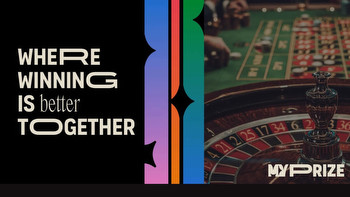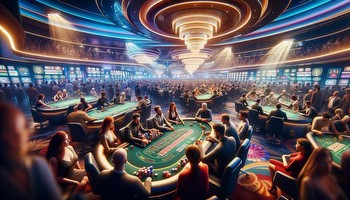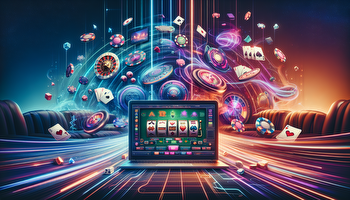The Social Aspect of Online Gaming: Chatrooms, Communities, and Multiplayer Games

Experts who study gaming predict that online gaming will become a huge industry worth $100 billion by 2026. One reason for this growth is how online gaming sites embrace social technology. They are incorporating features like live casino gaming and multiplayer games to make the experience more interactive.
Instead of (or in addition to) just playing alone, you can join others in live games like those found on some of the sites seen on maplecasino.ca and perhaps even chat with them while playing. For many players, the social connections and relationships built through these channels are as much a part of the appeal as the games themselves.
If you’ve only ever thought of online gaming as a solo pastime, it’s time to explore how to get social with this global community of players.
Chat Rooms in Online Gaming Platforms
Chat Rooms are a key part of the social experience on many online gaming platforms today. Most major sites offer live chat features where you can talk with other players in real-time. This allows for quick questions, sharing big wins, commiserating over losses, and building community.
Additionally, some sites even have specific chat rooms for certain games, stakes, or regions. For example, a poker site may have separate chat rooms for players at the micro, low, mid, and high stakes. This lets you connect with players at your level. In these chatrooms, you can discuss strategy, find private home games, or make new friends with common interests.
Online Gaming Communities
Online gaming communities refer to forums, groups, and chat rooms centered around gaming activities and experiences. These communities allow players worldwide to connect and bond over their shared interest in gaming.
The social connections formed in these communities keep players engaged and coming back. Receiving validation from other members for big wins or encouragement after losses feeds into the psychological and emotional aspects of gaming.
However, these communities also enable problem gaming by normalizing excessive gaming behavior and minimizing losses. It is easy to get caught up in the thrill of wins and camaraderie, losing sight of responsible gaming practices.
Multiplayer Gaming Options
Multiplayer games have become popular in online gaming because they provide an interactive social experience. Rather than playing against a computer, you can play against or with real people worldwide. This adds an extra element of competition and community. Some of the most popular multiplayer games include:
1. Online Poker
Online poker rooms host multiplayer tables where people play together in real time. Popular sites like PokerStars, WSOP.com, and PartyPoker offer tournaments and cash games for Texas Hold‘em, Omaha, and more. You can chat with other players, develop rivalries, and form friendships.
2. Virtual Casino Games
Some casinos provide multiplayer versions of classic table games like blackjack, baccarat, and roulette. At Live Dealer casinos, real dealers run the games via live stream as players bet and chat together.
3. Esports Betting
Esports has become hugely popular, with major competitive gaming leagues and millions of fans worldwide. Many sportsbooks now offer esports betting, allowing you to wager on the outcome of matches in games like Dota 2, League of Legends, and Counter-Strike: Global Offensive. Chat with fellow esports bettors to discuss odds, picks, and more.
Future Trends in Online Gaming
The future of online gaming is a seamless blend of cutting-edge technology and social connection. With an open and thoughtful approach, players can enjoy the benefits of online gaming while avoiding potential harm. The key is balancing technology with real human relationships. Below are some trends that are expected to boom in the future:
AI and Blockchain
As online gaming continues to grow, two emerging technologies are impacting the industry: artificial intelligence (AI) and blockchain.
AI creates more customized experiences for players by analyzing data to determine preferences and recommend games. Some platforms even use AI for responsible gaming initiatives, detecting problematic behavior, and offering help.
Blockchain, the technology behind cryptocurrencies like Bitcoin, is also revolutionizing online gaming. This allows for secure, transparent transactions and a reliable way to verify results in games that use random number generators. Several online casinos have started accepting cryptocurrency payments; others are testing blockchain-based games.
Virtual and Augmented Reality
VR transports players into a digital casino or lets them experience multiplayer poker or blackjack with life-size avatars of other players. Using a mobile device, AR brings digital elements like slot reels, dice, or cards into the real world. A few online casinos have started offering VR casinos and multiplayer poker. While still a niche, VR, and AR have the potential to make online gaming far more immersive and social.
Social Media Integration
Online casinos increasingly integrate social media platforms to build brand awareness and connect with players. Social networks like Facebook, Twitter, and Instagram are used for promotions, contests, and customer service.
Aside from that, some casinos also work with social media influencers who post reviews and share information about new games or events. These influencers have large followings, so their endorsements and opinions carry weight. Players often look to influencers for recommendations and advice.
Explore the Social Sides of Online Gaming Responsibly
As you’ve seen, online gaming today offers much more than just placing bets and winning money. The social connections formed through chat rooms, online communities, and multiplayer games provide many a sense of belonging and friendship.
However, it’s important to gamble responsibly and avoid becoming isolated or addicted. While the future of online gaming and its social aspects looks bright, maintain real-world relationships and take breaks when needed.
The social sides of online gaming can enhance the experience but should not replace meaningful in-person interactions. Explore and enjoy, but do so cautiously.




































